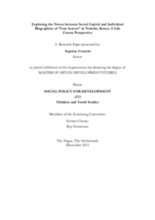Abstract
Young people leaving institutional care are often labelled “orphans” as children, and “care leavers” as young adults and have been widely neglected in Kenya in policies, and, consequently, excluded from support. As children, they face a multiplicity of vulnerabilities resulting from a lack of necessary support to address underlying structural issues. Mis-identification of risk factors by government and non-governmental organizations often result in unnecessary institutionalization. Within these institutions their vulnerabilities are further reinforced; often socially excluded from normative socio-cultural experiences and enmeshed in abusive, exploitative and neglectful relationships that further disadvantage them when they leave institutions. Employing a life course perspective and drawing upon these young people’s stories, along with focus group discussions and views from staff, this paper explores the concept of social capital and the ways in which this influences their lives before care, in care and after care.

